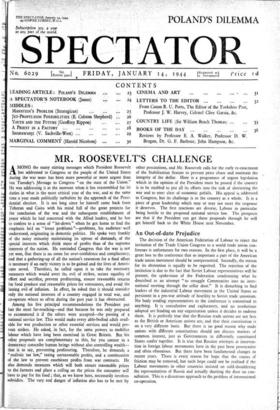MR. ROOSEVELT'S CHALLENGE
AMONG the many stirring messages which President Roosevelt has addressed to Congress or the people of the United States during the war none has been more powerful or more urgent than last Tuesday's Message to Congress " on the state of the Union." He was addressing it at the moment when it has reassembled for its duties in what is the most critical year of the war, and at the same time a year made politically turbulent by the approach of the Presi- dential election. It is not long since he himself came back from Teheran and Cairo with his mind full of the great projects for the conclusion of the war and the subsequent establishment of peace which he had concerted with the Allied leaders, and he has to confess to a sense of " let-down " when he got home to find the emphasis laid on " lesser problems "—problems, his audience. well understood, originating in domestic politics. He spoke very frankly of the noisy minority maintaining its uproar of demands, of the special interests which think more of profits than of the supreme interests of the nation. He reminded Congress that the war is not yet won, that there is no room for over-confidence and complacency, and that a gathering-up of all the nation's resources for a fmal effort is necessary if an, early victory is to be gained and the lives of Ameri- cans saved. Therefore, he called upon it to take the necessary measures which would avert the evil of strikes, secure equality of effort and sacrifice, prevent profiteering, ensure reasonable returns for food produce and reasonable prices for consumers, and avoid the lasting evil of inflation. In effect, he asked that it should consider only the national interests of a country engaged in total war, and co-operate where so often during the past year it has obstructed.
Among his five principal recommendations the President put last the most far-reaching—and that because he was only prepared to recommend it if the others were accepted—the passing of a national service law. This would make every able-bodied adult avail- able for war production or other essential services and would pre- vent strikes. He asked, in fact, for the same powers to mobilise labour which have long been exercised in Great Britain. But his other proposals are complementary to this, for you cannot in a democracy conscribe human beings without also controlling wealth— that is to say, preventing profiteering. Therefore, he demands a " realistic tax law," taxing unreasonable profits, and a continuation of the law to prevent exorbitant profits from war contracts. He also demands measures which will both ensure reasonable prices to the farmers and place a ceiling on the prices the consumer will have to pay for his food ; that, as we know here, necessarily involves subsidies. The very real danger of inflation also has to be met by
other precautions, and Mr. Roosevelt calls for the early re-enactment of the Stabilisation Statute to prevent price chaos and maintain the integrity of the dollar. Here is a programme of urgent legislation which in the opinion of the President must be passed if the country is to be enabled to put all its efforts into the task of shortening the war and to steer clear of economic pitfalls. His appeal is addressed to Congress, but its challenge is to the country as a whole. It is a piece of great leadership which may or may not meet the response it deserves. The first reactions are diverse, Labour in particular being hostile to the proposed national service law. The prospects are that if the President can get these proposals through he will get himself back to the White House next November.


























